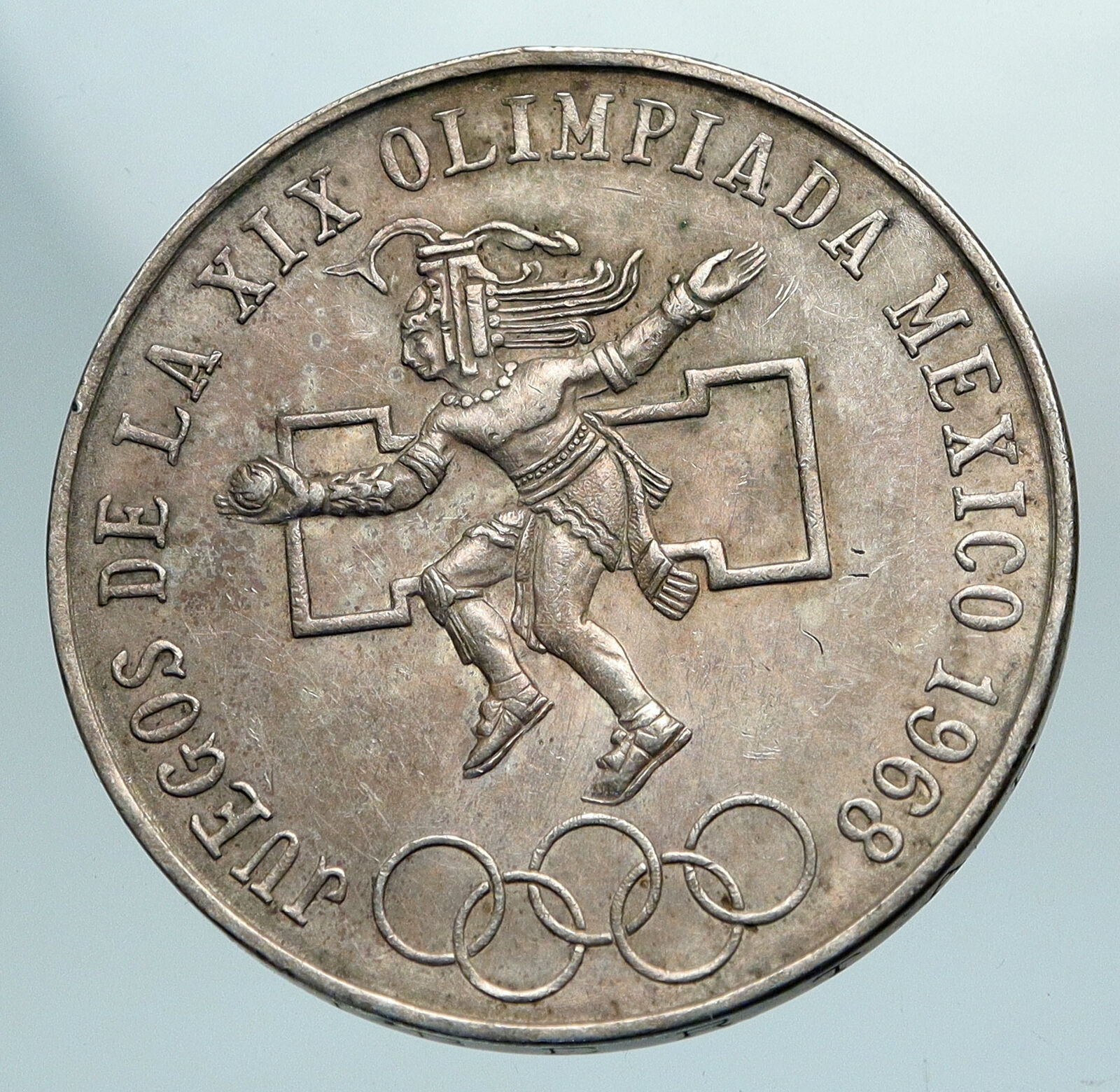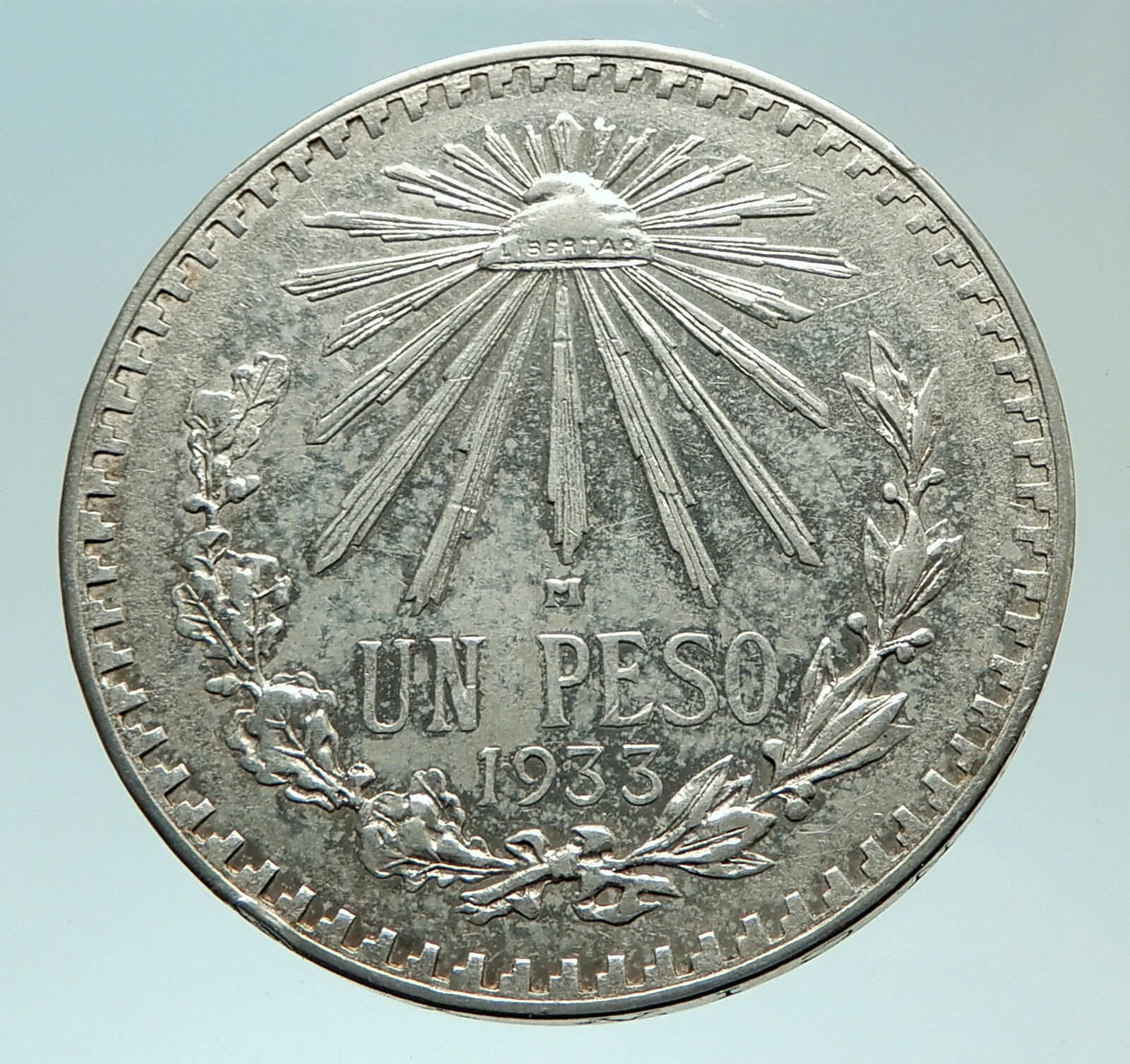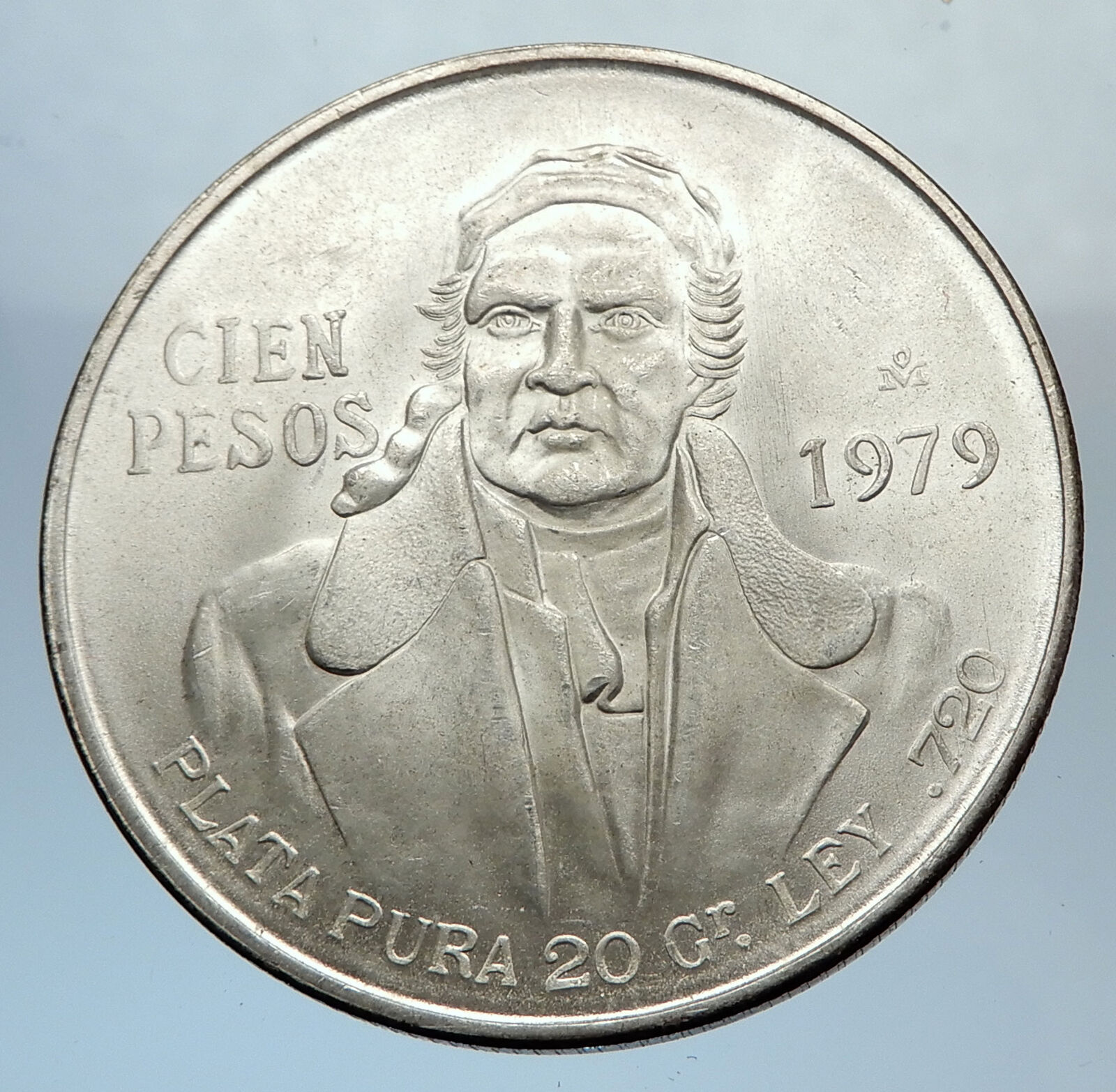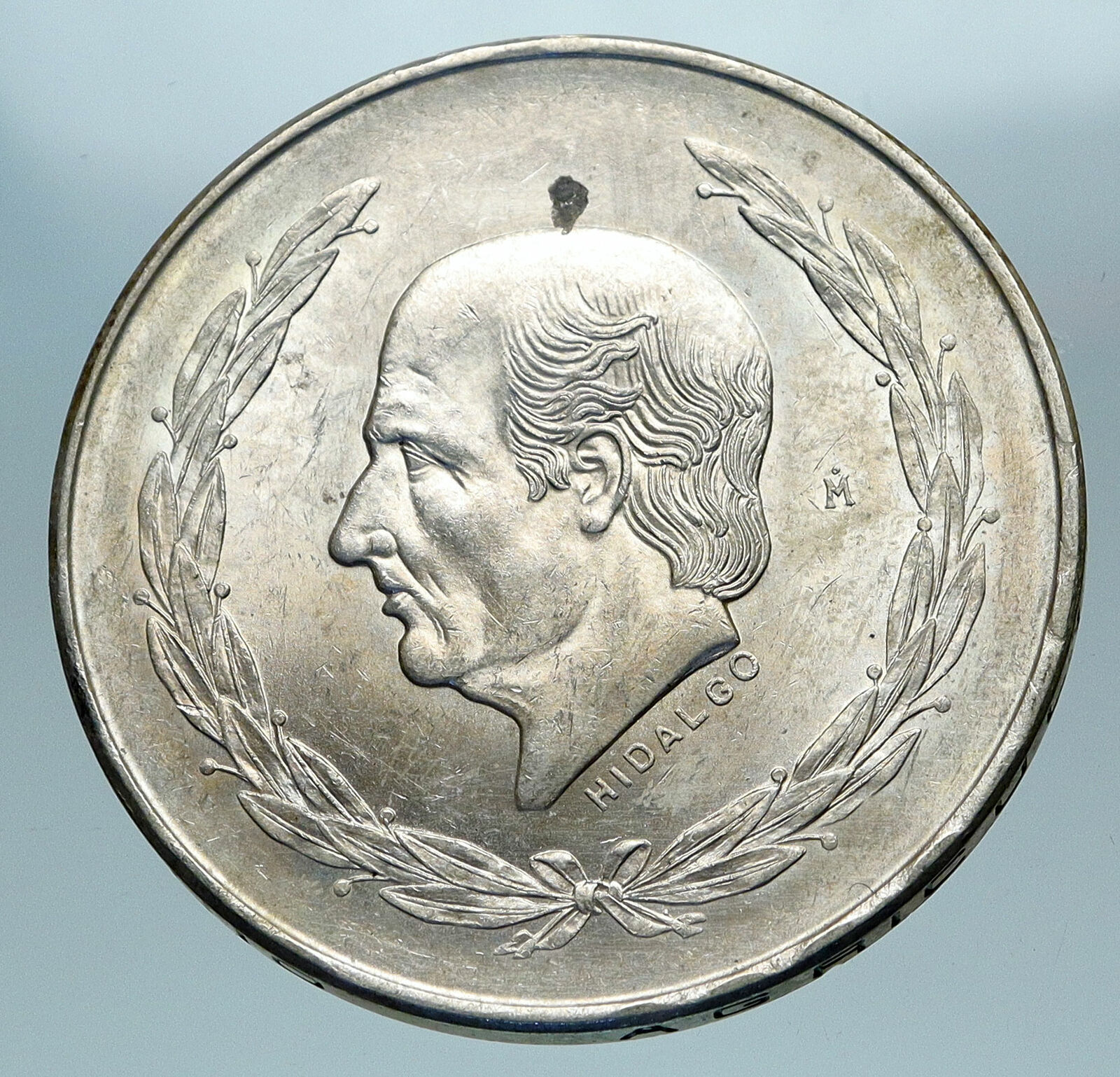|
Mexico – Medallic Coinage
1980 Silver Peso 41mm (33.45 grams) 0.925 Silver (1.00 oz. ASW)
Reference: KM# M49b.5
Certification: NGC MS 63 2864199-006
CASA DE MONEDA DE MEXICO, coin press; year in field to left.
UNA ONZA DE PLATA PURA LEY .925 PESO 33.625 GRAMOS Mo, Balance scale.
Coin mint called “de balancín” (of sway), used in Mexico City Mint to make their first coins. This device uses the rotation of a pole on top with weight on a side to get enough speed to force a spiral down and mint the coin (later updated to use steam and then electric motor but the method was the same).
Some people think that these rounds contain more than one troy ounce of silver and are led to believe that they have scored two and a half extra grams of silver for free. The reason that these medallic pieces weigh 33.625 grams (instead of one troy ounce, 31.103 grams) is because the silver alloy used in them is, unusually, only .925 pure. 33.625 grams multiplied by .925 purity = 31.103 grams of pure silver.
You are bidding on the exact item pictured, provided with a Certificate of Authenticity and Lifetime Guarantee of Authenticity.
 Mexico, officially the United Mexican States, is a federal republic in North America. It is bordered on the north by the United States; on the south and west by the Pacific Ocean; on the southeast by Guatemala, Belize, Mexico, officially the United Mexican States, is a federal republic in North America. It is bordered on the north by the United States; on the south and west by the Pacific Ocean; on the southeast by Guatemala, Belize,  and the Caribbean Sea; and on the east by the Gulf of Mexico. Covering almost two million square kilometres (over 760,000 sq mi), Mexico is the fifth largest country in the Americas by total area and the 13th largest independent nation in the world. With an estimated population of over 113 million, it is the eleventh most populous and the most populous Spanish-speaking country in the world and the second most populous country in Latin America. Mexico is a federation comprising thirty-one states and a Federal District, its capital and largest city. and the Caribbean Sea; and on the east by the Gulf of Mexico. Covering almost two million square kilometres (over 760,000 sq mi), Mexico is the fifth largest country in the Americas by total area and the 13th largest independent nation in the world. With an estimated population of over 113 million, it is the eleventh most populous and the most populous Spanish-speaking country in the world and the second most populous country in Latin America. Mexico is a federation comprising thirty-one states and a Federal District, its capital and largest city.
In pre-Columbian Mexico many cultures matured into advanced civilizations such as the Olmec, the Toltec, the Teotihuacan, the Zapotec, the Maya and the Aztec before first contact with Europeans. In 1521, the Spanish Empire conquered and colonized the territory from its base in Mexico-Tenochtitlan, which was administered as the Viceroyalty of New Spain. This territory would eventually become Mexico following recognition of the colony’s independence in 1821. The post-independence period was characterized by economic instability, the Mexican-American War that led to the territorial cession to the United States, the Pastry War, the Franco-Mexican War, a civil war, two empires and a domestic dictatorship. The latter led to the Mexican Revolution in 1910, which culminated with the promulgation of the 1917 Constitution and the emergence of the country’s current political system. In March 1938, through the Mexican oil expropriation private U.S. and Anglo-Dutch oil companies were nationalized to create the state-owned Pemex oil company.
 Mexico has one of the world’s largest economies, it is the tenth largest oil producer in the world, the largest silver producer in the world and is considered both a regional power and middle power. In addition, Mexico was the first Latin American member of the Organisation for Economic Co-operation and Development OECD (since 1994), and considered an upper-middle income country by the World Bank. Mexico is considered a newly industrialized country and an emerging power. It has the fifteenth largest nominal GDP and the tenth largest GDP by purchasing power parity. The economy is strongly linked to those of its North American Free Trade Agreement (NAFTA) partners, especially the United States. Mexico ranks sixth in the world and first in the Americas by number of UNESCO World Heritage Sites with 32, and in 2010 was the tenth most visited country in the world with 22.5 million international arrivals per year. According to Goldman Sachs, by 2050 Mexico is expected to become the world’s fifth largest economy. PricewaterhouseCoopers (PwC) estimated in January 2013 that by 2050 Mexico could be the world’s seventh largest economy. Mexico has membership in prominent institutions such as the UN, the WTO, the G20 and the Uniting for Consensus. Mexico has one of the world’s largest economies, it is the tenth largest oil producer in the world, the largest silver producer in the world and is considered both a regional power and middle power. In addition, Mexico was the first Latin American member of the Organisation for Economic Co-operation and Development OECD (since 1994), and considered an upper-middle income country by the World Bank. Mexico is considered a newly industrialized country and an emerging power. It has the fifteenth largest nominal GDP and the tenth largest GDP by purchasing power parity. The economy is strongly linked to those of its North American Free Trade Agreement (NAFTA) partners, especially the United States. Mexico ranks sixth in the world and first in the Americas by number of UNESCO World Heritage Sites with 32, and in 2010 was the tenth most visited country in the world with 22.5 million international arrivals per year. According to Goldman Sachs, by 2050 Mexico is expected to become the world’s fifth largest economy. PricewaterhouseCoopers (PwC) estimated in January 2013 that by 2050 Mexico could be the world’s seventh largest economy. Mexico has membership in prominent institutions such as the UN, the WTO, the G20 and the Uniting for Consensus.
|









 Mexico, officially the United Mexican States, is a federal republic in North America. It is bordered on the north by the United States; on the south and west by the Pacific Ocean; on the southeast by Guatemala, Belize,
Mexico, officially the United Mexican States, is a federal republic in North America. It is bordered on the north by the United States; on the south and west by the Pacific Ocean; on the southeast by Guatemala, Belize,  and the Caribbean Sea; and on the east by the Gulf of Mexico. Covering almost two million square kilometres (over 760,000 sq mi), Mexico is the fifth largest country in the Americas by total area and the 13th largest independent nation in the world. With an estimated population of over 113 million, it is the eleventh most populous and the most populous Spanish-speaking country in the world and the second most populous country in Latin America. Mexico is a federation comprising thirty-one states and a Federal District, its capital and largest city.
and the Caribbean Sea; and on the east by the Gulf of Mexico. Covering almost two million square kilometres (over 760,000 sq mi), Mexico is the fifth largest country in the Americas by total area and the 13th largest independent nation in the world. With an estimated population of over 113 million, it is the eleventh most populous and the most populous Spanish-speaking country in the world and the second most populous country in Latin America. Mexico is a federation comprising thirty-one states and a Federal District, its capital and largest city. Mexico has one of the world’s largest economies, it is the tenth largest oil producer in the world, the largest silver producer in the world and is considered both a regional power and middle power. In addition, Mexico was the first Latin American member of the Organisation for Economic Co-operation and Development OECD (since 1994), and considered an upper-middle income country by the World Bank. Mexico is considered a newly industrialized country and an emerging power. It has the fifteenth largest nominal GDP and the tenth largest GDP by purchasing power parity. The economy is strongly linked to those of its North American Free Trade Agreement (NAFTA) partners, especially the United States. Mexico ranks sixth in the world and first in the Americas by number of UNESCO World Heritage Sites with 32, and in 2010 was the tenth most visited country in the world with 22.5 million international arrivals per year. According to Goldman Sachs, by 2050 Mexico is expected to become the world’s fifth largest economy. PricewaterhouseCoopers (PwC) estimated in January 2013 that by 2050 Mexico could be the world’s seventh largest economy. Mexico has membership in prominent institutions such as the UN, the WTO, the G20 and the Uniting for Consensus.
Mexico has one of the world’s largest economies, it is the tenth largest oil producer in the world, the largest silver producer in the world and is considered both a regional power and middle power. In addition, Mexico was the first Latin American member of the Organisation for Economic Co-operation and Development OECD (since 1994), and considered an upper-middle income country by the World Bank. Mexico is considered a newly industrialized country and an emerging power. It has the fifteenth largest nominal GDP and the tenth largest GDP by purchasing power parity. The economy is strongly linked to those of its North American Free Trade Agreement (NAFTA) partners, especially the United States. Mexico ranks sixth in the world and first in the Americas by number of UNESCO World Heritage Sites with 32, and in 2010 was the tenth most visited country in the world with 22.5 million international arrivals per year. According to Goldman Sachs, by 2050 Mexico is expected to become the world’s fifth largest economy. PricewaterhouseCoopers (PwC) estimated in January 2013 that by 2050 Mexico could be the world’s seventh largest economy. Mexico has membership in prominent institutions such as the UN, the WTO, the G20 and the Uniting for Consensus.




